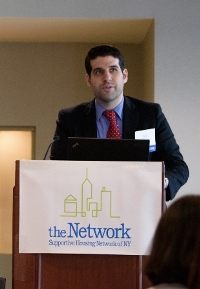Categories:
03.13.2018
Dan shares resources to help SHNNY members manage tenant conflicts.

Housing providers encounter many conflicts involving tenants. These include neighbor and roommate disputes, non-payment of rent, violations of community guidelines, and escalated situations related to aggression, substance use, or psychiatric symptoms. Even though these problems happen regularly, they are still stressful and uncomfortable to manage, especially when different staff members make different choices about how to handle them.
Conflict resolution techniques can help housing sites develop consistent, effective approaches across the entire spectrum of conflict resolution - preventing problems, managing conflicts, and responding to escalation.
Most often, organizations seek support with escalated situations. The most common request I field from housing providers is how to prevent unnecessary 911 calls. Maybe staff could have done something differently before the tenant erupted into an aggressive act. Are there some special de-escalation techniques we can use to diffuse these situations?
There is no single definitive right way to de-escalate. Every site has to look to its own values, policies, and population to figure out what is appropriate for them. But there is one universal best practice all housing sites can implement: planning ahead. Planning ahead reduces human error, removes the risk of biased intervention, creates consistency across staff, and – perhaps most importantly – helps staff feel comfortable implementing their interventions. Even though every site is different, they can all use the same planning template to develop their best practices.
 The most important first step is clearly defining the behavior at issue. That term I used before –“aggressive act” – is too vague. Ambiguous terms like “aggression” or “violence” can mean different things to different people so we have to specify the concrete behaviors involved, like “destruction of property,” “verbal threats,” “physical intimidation,” or “physical altercation.” Then we can draw clear lines of when to act and how to act in each situation. Do we call 911 whenever someone throws something, or does the tenant have to throw the object at someone? How long do we give someone to calm down on their own before we intervene?
The most important first step is clearly defining the behavior at issue. That term I used before –“aggressive act” – is too vague. Ambiguous terms like “aggression” or “violence” can mean different things to different people so we have to specify the concrete behaviors involved, like “destruction of property,” “verbal threats,” “physical intimidation,” or “physical altercation.” Then we can draw clear lines of when to act and how to act in each situation. Do we call 911 whenever someone throws something, or does the tenant have to throw the object at someone? How long do we give someone to calm down on their own before we intervene?
When we plan for a behavior, we explore its entire life cycle. What are the specific early warning signs where we might be able to take a preventative action, like offering a gentle reminder of a community guideline? When is it appropriate, upon noticing someone raising their voice or engaging in conflict, for us to step in to de-escalate? What is the line where we know, for sure, that it is now time for an emergency intervention like the 911 call? Instead of making these decisions in-the-moment using gut feelings, we all do better when we invest time in creating behavior plans.
Conflict resolution practices can be even more powerful when we use them to prevent challenging behaviors from happening in the first place. Housing sites can embed key values like fairness, self-determination, and validation throughout their internal cultures to reduce the likelihood of escalation.
One way to accomplish this is by providing resources for tenants to practice conflict resolution skills. This can be done through on-site trainings, as part of skills groups, or through distributing self-help resources such as handouts and online programs. Through these resources, tenants can practice vital skills that help them appreciate different points of view in conflict, engage in effective communication to understand everyone’s needs, and develop sustainable, realistic agreements that resolve conflicts.
Another way to improve site culture is by adjusting staff talking points to emphasize conflict resolution values. Instead of saying, “that’s against the rules,” staff could say, “we can’t permit that because we don’t play favorites here - we treat everyone the same because we care about being fair.” Language shifts like this can begin establishing fairness as a community value and diffuse tensions before they escalate.
Some conflicts will still happen. Most housing providers empower staff to act as formal or informal arbitrators supporting tenants in resolving their conflicts. Practicing skills such as demonstrating fairness and developing effective agreements can help them in these roles.
MH Mediate has prepared a page of resources for SHNNY members including infographics building on concepts in this post. Members can also e-mail me at dan@mhmediate.com with questions any time.
Conflict Resolution Resources for SHNNY Members
Dan Berstein, MHS combines his professional expertise as a mediator, his academic background in mental health and public health, and his personal experience living with bipolar disorder to develop innovative trainings and services in the areas of conflict resolution, mental health communication, challenging behaviors, and accessibility to disabilities. Through his company, MH Mediate, Dan has provided programs in over a dozen states to clients including housing providers and government agencies at the city, state, and federal levels.
Dan is Vice Chair of the Diversity Committee of the American Bar Association Section on Dispute Resolution and the Program Consultant for the CUNY Dispute Resolution Center’s Dispute Resolution in Mental Health Initiative. He holds degrees from the Johns Hopkins School of Public Health and the Wharton School.
